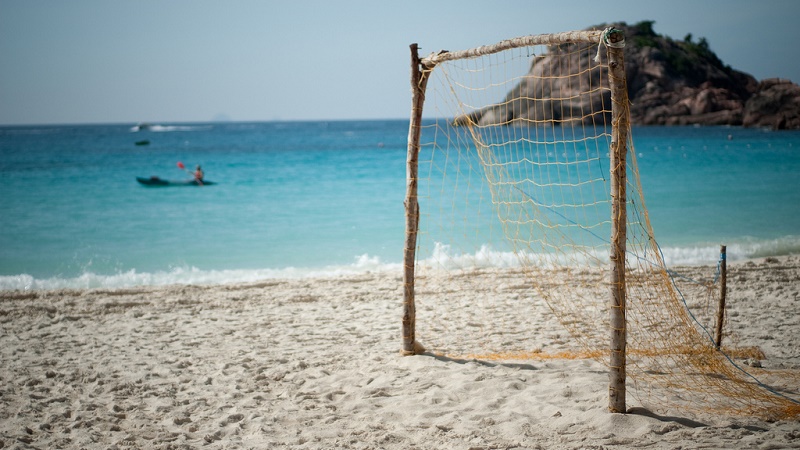What does the Paris Agreement stretch goal of holding global warming to 1.5C really mean?
We came a step closer to answering that question this week, with the leaked draft summary of a UN special report on the target.
It states more clearly than a previous version that 2C is “substantially” riskier than 1.5C. On the feasibility of meeting the tighter threshold, it drops the most sceptical language, while still highlighting significant obstacles.
Read the full annotated text here and our round-up of the key messages.
Governments have a chance to comment on the draft before it is finalised for publication in October. Watch out for attempts to water down the uncomfortable conclusions.
A gif shared by Marshallese environment minister David Paul powerfully illustrates why it matters to the Pacific island state. Three feet of sea level rise, which could happen this century on current warming trends, would render the capital Majuro virtually uninhabitable.
Paper planes
One sector that is not explicitly mentioned in the 1.5C report summary but accounts for a growing share of global emissions is aviation.
With fossil-free flying a distant prospect, the industry is looking to compensate for its carbon footprint with offsets. The environmental integrity of that system hangs on eligibility criteria to be decided in the next three months.
Brazil and China are pushing for all carbon credits generated under the UN’s Clean Development Mechanism to count. European analysts warn that a glut of old projects could paper over airlines’ obligations for less than €1 a tonne of carbon dioxide, without driving any new emissions cuts.
CFC crime
A study last month showed mysteriously high levels of the long-banned chemical CFC-11 over East Asia.
The fast-working Environmental Investigations Agency has traced the source to factories in China, where it is being used in the production of rigid foams for insulation.
As well as harming the ozone layer, this illegal activity has a climate impact equivalent to 16-20 coal power plants, the green watchdog estimates.
CHN tracked down UN environment chief Erik Solheim (see below) in Oslo this week and asked him what his organisation planned to do to enforce international law. He said he hadn’t yet seen the EIA report.
Looking ahead
Wednesday, 4 July, the high court will decide whether to allow a judicial review of the UK’s climate targets. Plaintiffs aged 9-79, including a former government scientist, argue the existing legislation is not strong enough and should be amended in line with a 1.5C global warming limit to protect human rights.
Trade war
Donald Trump’s protectionist agenda is giving the markets jitters, but is it bad for the environment?
UN green chief Solheim thinks so, telling Climate Home News: “It will make the entire system for environment, for peace and for development, every issue, much more difficult if we were to see a major trade war.”
Trade expert Susanne Dröge disagrees, pointing out that whatever you think of the social consequences, past economic crises like the 2008 financial crash led to reduced consumption and therefore emissions.
Best friends forever
Australian prime minister Malcolm Turnbull was once a defender of climate action within his Liberal Party.
Now, he has well and truly succumbed to the pro-coal talking points, saying it would have a role in the energy mix “for many, many years to come, possibly forever”.
His comment came in a parliamentary debate over an energy policy that climate analysts say is insufficient to meet the country’s weak emissions targets.
Dutch courage
Meanwhile, the Netherlands is proposing to cut emissions 95% by 2050, under a draft climate law introduced to parliament this week.
Backed by seven political parties across the spectrum, it would be among the most ambitious carbon targets in the world, although campaigners want to see more evidence of real short-term action.
The country is among 14 EU member states calling for an upgrade in the bloc’s ambition, to align with a 1.5C warming limit.
What the Farc
Tree loss has rocketed in Colombia since the government signed a peace deal with rebel group Farc in 2016, a report from the World Resources Institute highlights.
Civilians are taking their chance to clear land for cattle ranches and mines, while criminal groups get into illegal logging and coca farming.
Globally, an area of forest the size of Bangladesh was destroyed last year, equivalent to 40 football fields a minute.
Half measures
The EU is investing heavily in LNG as a shipping fuel, citing the climate benefits of moving away from dirtier bunker fuel.
But researchers warned gas alone could not meet the sector’s carbon targets and cleaner fuels and technologies were urgently needed.
A high gas scenario would only cut emissions 6-10% by 2050, they estimated, falling short of the global goal of “at least 50%”.
